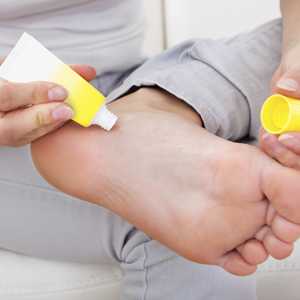Treatment for Ringworm

Athlete's foot can usually be treated with non-prescription medication applied to the skin.
The treatment for ringworm depends on its location on the body and how serious the infection is. Some forms of ringworm can be treated with non-prescription (“over-the-counter”) medications, but other forms of ringworm need treatment with prescription antifungal medication.
- Ringworm on the skin like athlete’s foot (tinea pedis) and jock itch (tinea cruris) can usually be treated with non-prescription antifungal creams, lotions, or powders applied to the skin for 2 to 4 weeks. There are many non-prescription products available to treat ringworm, including:
- Clotrimazole (Lotrimin, Mycelex)
- Miconazole (Aloe Vesta Antifungal, Azolen, Baza Antifungal, Carrington Antifungal, Critic Aid Clear, Cruex Prescription Strength, DermaFungal, Desenex, Fungoid Tincture, Micaderm, Micatin, Micro-Guard, Miranel, Mitrazol, Podactin, Remedy Antifungal, Secura Antifungal)
- Terbinafine (Lamisil)
- Ketoconazole (Xolegel)
For non-prescription creams, lotions, or powders, follow the directions on the package label. Contact your healthcare provider if your infection doesn’t go away or gets worse.
- Ringworm on the scalp (tinea capitis) usually needs to be treated with prescription antifungal medication taken by mouth for 1 to 3 months. Creams, lotions, or powders don’t work for ringworm on the scalp. Prescription antifungal medications used to treat ringworm on the scalp include:
- Griseofulvin (Grifulvin V, Gris-PEG)
- Terbinafine
- Itraconazole (Onmel, Sporanox)
- Fluconazole (Diflucan)
You should contact your healthcare provider if:
- Your infection gets worse or doesn’t go away after using non-prescription medications.
- You or your child has ringworm on the scalp. Ringworm on the scalp needs to be treated with prescription antifungal medication.
If you are a healthcare provider, please click here for more information about ringworm treatment.
- Page last reviewed: December 6, 2015
- Page last updated: December 6, 2015
- Content source:


 ShareCompartir
ShareCompartir